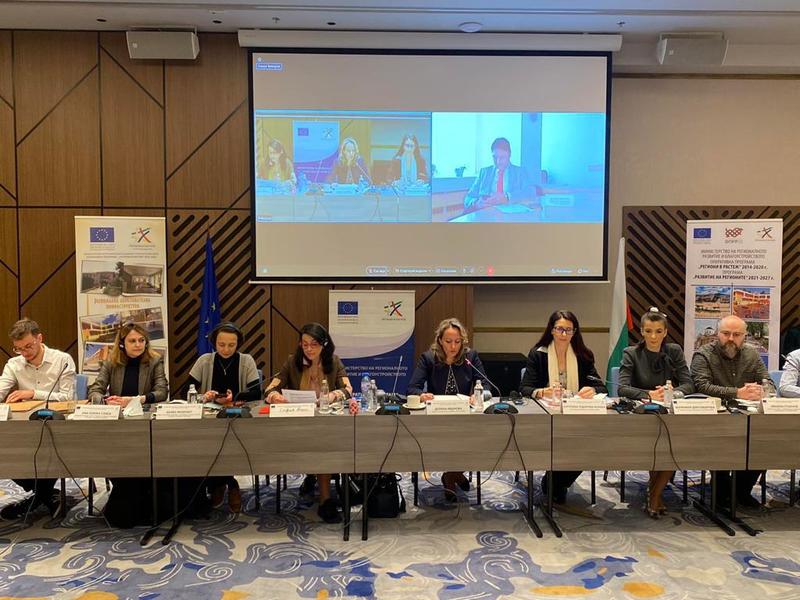The Ministry of Regional Development and Public Works is redirecting over BGN 60 million from the European funds in support of the refugees from Ukraine
The Ministry of Regional Development and Public Works is redirecting over BGN 60 million from the European fun
By Ministry of Regional Development and Public Works
The Ministry of Regional Development and Public Works will redirect more than BGN 60 million, saved European funds, to support local authorities for the crisis with refugees from Ukraine. This was announced by Deputy Minister Delyana Ivanova at the 20th meeting of the Monitoring Committee of the Operational Program "Growing Regions" 2014-2020. The funds will be used under the new instrument of the European Commission "Cohesion Action for Refugees in Europe - CARE" . It will help the Member States to meet the challenges of the war in Ukraine. Its budget will be formed from saved funds under operational programs and from unfulfilled European projects.
"After the COVID-19 pandemic, we have a new crisis - the consequences of the war in Ukraine. Bulgaria is one of the countries that accepts refugees. I want to express the support of the EC. We want to work with the Member States so that unused funds and those that will not be used by the end of the programming period are redirected to support refugees and, above all, the local authorities that accept them. The aim is to overcome the difficulties that member states are experiencing at the national, regional and local levels, "said Sofia Alves - Director of the Directorate General for Regional and Urban Policy at the European Commission. This means that if funds are saved or projects are not implemented for some reason, the free resource should come together and be given priority for use in the current situation.
According to the preliminary estimate of the EC, the necessary financial resources are about 10 billion euros for this and next year. About 9 billion euros will be set aside from them this year, and 1 billion euros in 2023.
With these funds, Member States can only cover eligible costs for the care of refugees from Ukraine, such as improving temporary accommodation, food, livelihoods and more. The number of refugees is expected to reach 4 million by June. The eligible costs will be finally approved after the new instrument is discussed with all EU national authorities.
"About BGN 32 million saved from OPRD can be directed to the new CARE instrument and possibly another BGN 30 million from React EU funds," said Deputy Minister Delyana Ivanova, who is also head of the Managing Authority of the operational program.
During the meeting, the Deputy Minister of Regional Development and Public Works presented the efforts of the team of the Ministry of Regional Development and Public Works in the last three months to accelerate the pace of achieving the goals of the program. "After everything done so far, we can say that there is no risk of losing funds by the end of 2022," said Ivanova.
So far, 79 projects for educational infrastructure and 216 for energy efficiency in residential and administrative buildings have been implemented. The completed projects for urban environment in the large municipalities are 36, and 64 contracts have been concluded to support the process of deinstitutionalization of children and adults. 24 contracts have been finalized for renovation and modernization of road infrastructure.
Under OPRD 2014-2020, 761 grant agreements have been concluded. Of these, 293 are in the process of implementation, and the implementation of the remaining 468 has been completed. Almost 62% of the projects with verified and paid costs, Ivanova listed the results.
Delyana Ivanova also presented the effect of OPRD investments on the main macroeconomic indicators in the country. As a result, gross domestic product (GDP) increased by 0.6%, private investment - by 1.4%, and imports increased by 0.7%.
"Guided by the partnership principle and the belief that only together we can achieve significant success, we mobilized all our efforts and capabilities in order to maximize the effective implementation and payment of the program," said the Deputy Minister. According to her, in partnership with all stakeholders and institutions, lessons learned and lessons learned from the new programming period to ensure better success of the new program.
It was noted that for the new programming period the Governing Body and at the national level face serious challenges related to the implementation of the new regional approach. These are integrated territorial investments and investments from the Fair Transition Fund, which is a priority for a climate-neutral economy and targeted at regions that should work for a green economy.




